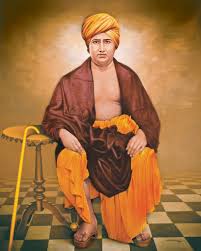Swami Dayanand Saraswati
Dayananda was an important Hindu reformist whose views did much to promote gender-equality, democracy, education, as well as a new confidence in India’s cultural past and future capabilities. In some respects, he qualifies as an architect of modern India as am emerging scientific and technological power. Aspects of his views impacted negatively on inter-religious relations, however, and contributed to extreme forms of Hindu nationalism which denies non-Hindus their complete civil rights. Yet, in his own day, when he spoke of the superiority of Hindu culture and religion, he was doing so in defense of what Europeans in India had insulted and denigrated. A consequence of assuming racial, cultural, or religious superiority over others is that they retaliate, and reverse what is said about them. The Arya Samaj is now a worldwide movement.
In 1845, he declared that he was starting a quest for enlightenment, or for liberation (moksha), left home and started to denounce image-veneration. His parents had decided to marry him off in his early teens (common in nineteenth century India), so instead Dayananda chose to become a wandering monk. He learned Panini’s Grammar to understand Sanskrit texts. After wandering in search of guidance for over two decades, he found Swami Virjananda (1779-1868) near Mathura who became his guru. The guru told him to throw away all his books in the river and focus only on the Vedas. Dayananda stayed under Swami Virjananda’s tutelage for two and a half years. After finishing his education, Virjananda asked him to spread the concepts of the Vedas in society as his gurudakshina (“tuition-dues”), predicting that he would revive Hinduism.
Dayananda set about this difficult task with dedication, despite attempts on his life. He traveled the country challenging religious scholars and priests of the day to discussions and won repeatedly on the strength of his arguments. He believed that Hinduism had been corrupted by divergence from the founding principles of the Vedas and misled by the priesthood for the priests’ self-aggrandizement. Hindu priests discouraged common folk from reading Vedic scriptures and encouraged rituals (such as bathing in the Ganges and feeding of priests on anniversaries) which Dayananda pronounced as superstitions or self-serving.
He also considered certain aspects of European civilization to be positive, such as democracy and its emphasis on commerce, although he did not find Christianity at all attractive, or European cultural arrogance, which he disliked intensely. In some respects, his ideas were a reaction to Western criticism of Hinduism as superstitious idolatry. He may also have been influenced by Ram Mohan Roy, whose version of Hinduism also repudiated image-veneration. He knew Roy’s leading disciple, Debendranath Tagore and for a while had contemplated joining the Brahmo Samaj but for him the Vedas were too central.
In 1869, Dayananda set up his first Vedic School, dedicated to teaching Vedic values to the fifty students who registered during the first year. Two other schools followed by 1873. In 1875, he founded the Arya Samaj in 1875, which spearheaded what later became known as a nationalist movement within Hinduism. The term “fundamentalist” has also been used with reference to this strand of the Hindu religion.